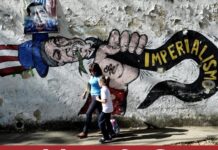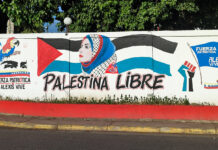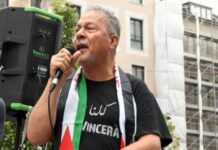Ziad Abu Ein, Palestinian Authority minister and head of the Committee Against the Wall and Settlements, was killed on Wednesday 10 December at a protest and olive-tree planting in Turmusayya village outside Ramallah after being hit, choked and tear-gassed by Israeli occupation forces.
Abu Ein was previously the deputy minister of prisoners’ affairs, and served 13 years as a political prisoner in Israeli prisons, including as an administrative detainee without charge or trial.
In 1981, when he was 20 years old and a member of GUPS (the General Union of Palestinian Students), Abu Ein was deported from the United States and extradited – after 2 years in US prisons – to Israeli jails, despite a large-scale campaign against his extradition and a strong legal defense team. Abdeen Jabara, one of Abu Ein’s lawyers who continues to be a strong defender of Palestinian rights, said at the time that Abu Ein’s deportation – based on torture evidence and despite Abu Ein’s contrary evidence – was “almost totally political.” The extradition of Abu Ein in 1981 is reminiscent of the cases of Hassan Diab and Rasmea Odeh, current cases of collusion between US, Canadian, French and Israeli authorities for the political imprisonment of Palestinians and Arabs.
Abu Ein, 55 and a longtime Fateh leader, was leading a procession of Palestinians and internationals in Turmusayya’s agricultural land to plant olive tree saplings on land that Israeli illegal settlers seek to confiscate. Their procession was confronted and attacked by Israeli occupation forces, who hit marchers including Abu Ein and fired multiple tear gas rounds and stun grenades. One tear gas canister reportedly hit Abu Ein.

He was pronounced dead in the ambulance en route to Ramallah hospital.
Samidoun Palestinian Prisoner Solidarity Network notes that the killing of Ziad Abu Ein is one of a long line of murders of Palestinians who seek to defend their land and their rights against occupation and oppression. The killing of Abu Ein is another crime committed by the settler colonial occupation, which is built on the murder, expulsion and dispossession of Palestinians.
The murder of Abu Ein, a minister of the Palestinian Authority, must be a clear imperative to finally cancel the treacherous “security coordination” between the PA and the occupation which has led to the imprisonment and killing of Palestinians and betrays and undermines all Palestinian organizing and resistance.
Furthermore, the murder of Ziad Abu Ein reminds us all that Palestinian political prisoners and former political prisoners are in the center of the Palestinian struggle at all levels and are constantly under threat from occupation attacks. We know that there will be no justice for this murder through the “investigations” or the justice system of the occupying power.
As in the case of the killings of Eric Garner, Michael Brown, John Crawford and countless other Black lives taken by racist police in the United States, there is no justice to come from the courts of a system of institutionalized racism.
Rather, the challenge is to escalate the struggle to bring down racist structures of settler colonialism, oppression and occupation, and to win liberation from, and victory over, the system that murders, occupies, kills and imprisons oppressed people struggling for existence, freedom and justice.
Discover more from Samidoun: Palestinian Prisoner Solidarity Network
Subscribe to get the latest posts sent to your email.




